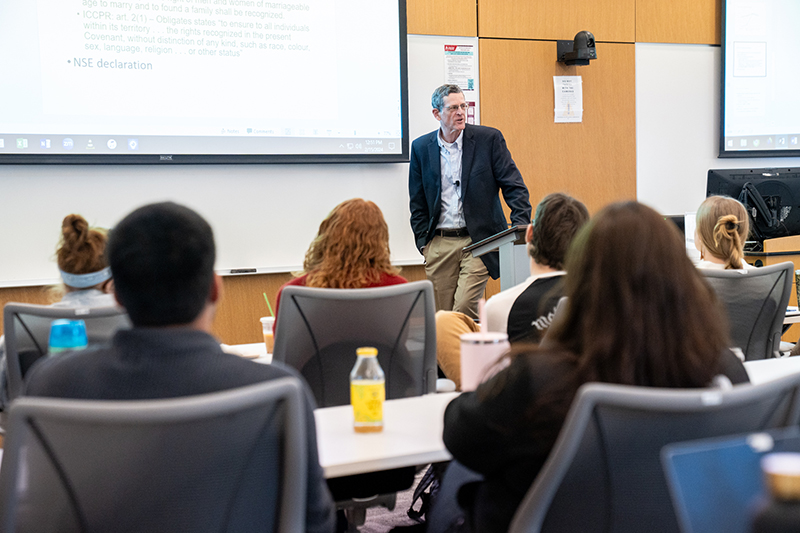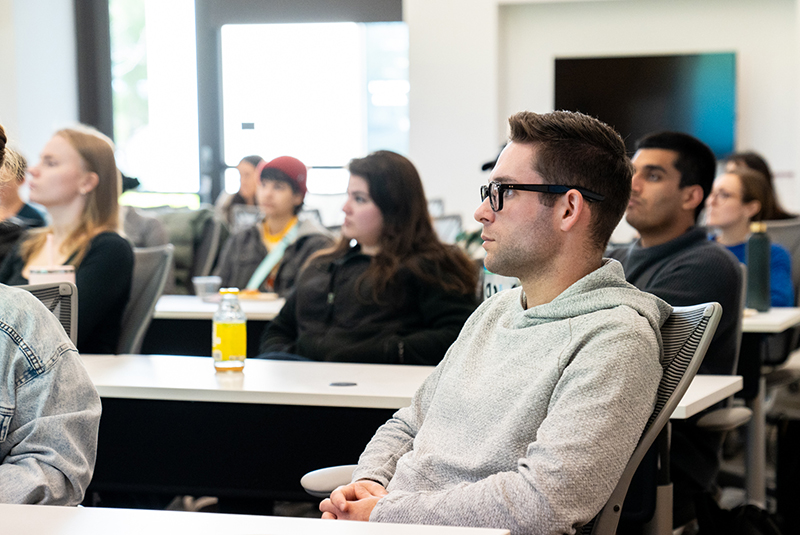 Students gathered in Charney Hall’s Lawyer’s Lab for a talk by Professor David Sloss, titled “SCOTUS v. The People: The Supreme Court’s Assault on American Democracy.” Touching on topics in his most recent book, Tyrants on Twitter: Protecting Democracies from Information Warfare, Professor Sloss also gave students exclusive sneak peeks into his next publication.
Students gathered in Charney Hall’s Lawyer’s Lab for a talk by Professor David Sloss, titled “SCOTUS v. The People: The Supreme Court’s Assault on American Democracy.” Touching on topics in his most recent book, Tyrants on Twitter: Protecting Democracies from Information Warfare, Professor Sloss also gave students exclusive sneak peeks into his next publication.
Professor Caitlin Jachimowicz welcomed her colleague and offered words of introduction to the assembled students, detailing Professor Sloss’ biography and knowledge of the legal field. Professor Sloss’ expertise covers a wide range of areas including international law, constitutional law, and international affairs. Before his time as a professor at Santa Clara Law, Sloss worked as a litigation assistant at Wilson, Sonsini, Goodrich & Rosati in Palo Alto and clerked for Senior Judge Joseph T. Sneed, U.S. Court of Appeals, Ninth Circuit, San Francisco. He then taught for nine years at St. Louis University School of Law before coming to California.
Professor Sloss began his talk by examining the purpose of the Supreme Court and the U.S. Constitution. “The Constitution is designed to ensure we have the power over major policy decisions through elections,” Sloss noted. “The Supreme Court, however, has created a body of law—constitutional law—that allows the Court itself to create a wide range of public policies by redesignating them as constitutional issues.” He raised a question to the assembled students: Is constitutional law, itself, unconstitutional?
Constitution. “The Constitution is designed to ensure we have the power over major policy decisions through elections,” Sloss noted. “The Supreme Court, however, has created a body of law—constitutional law—that allows the Court itself to create a wide range of public policies by redesignating them as constitutional issues.” He raised a question to the assembled students: Is constitutional law, itself, unconstitutional?
Sloss then pivoted to the purpose of judicial review, quoting venerable legal scholar John Hart Ely: “[judicial review] exists for those situations where representative government cannot be trusted.” Sloss held that Ely’s core purposes of judicial review were twofold in maintaining the prerequisites for a healthy democracy: a functioning electoral system and a vibrant information ecosystem. “Trust in government is at an all-time low,” Sloss remarked. “The question is: is the court parroting the public’s declining trust in the government? Or is the court to some extent driving the declining trust in government through its approach towards Congress? The reality is some of both.”
The conversation then shifted to the subject of Sloss’ new book, which he is currently writing: how the U.S. Supreme Court is subverting American democracy. “The Supreme Court has appropriated power for itself not given under the Constitution,” Sloss asserted. “It is violating the Constitution repeatedly by claiming power for itself. The Court reads into the Constitution, but is completely unwilling to impose any limitations on itself.” Sloss noted several fields of interest that the Court is supposed to support, but instead consistently opposes: elections, the information ecosystem, and minority rights, to name a few.
“These are all part of a broader pattern,” Sloss explained. “The First Amendment, as interpreted by the Supreme Court, has become a sort of enemy of democracy, which is odd; because in theory, the goal of the First Amendment is to help promote democracy!” He noted how, oftentimes, the Court should enforce laws passed by Congress and state legislatures. “But the Court does the opposite,” Sloss decried. “They invalidate them and declare them unconstitutional.”
See Professor Sloss’s full bio and selected publications here.
